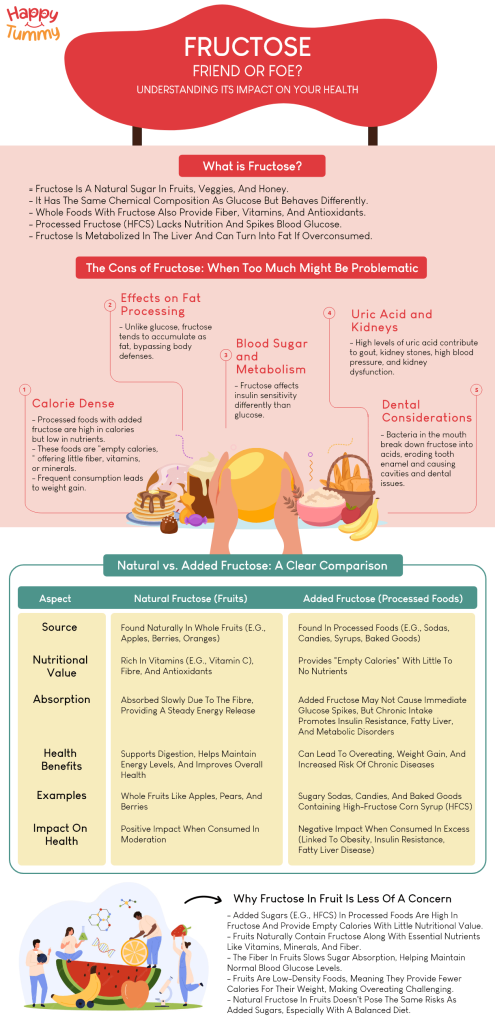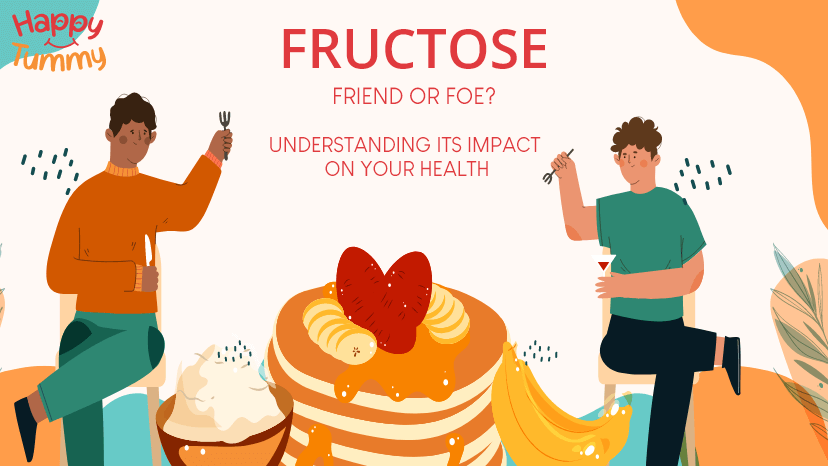Table of Contents
Sweet, uncomplicated, and deceptive, fructose is a sugar that is often concealed in the foods we enjoy.
This natural sugar has found its way into our daily meals, from fruit to processed snacks. But how well do we know it?
Although this is particularly due to its contribution to sweetened beverages and processed meals, the situation is not as straightforward.
Naturally occurring fructose in its moderate form may not be harmful but may be beneficial.
Nevertheless, it may cause various health problems, such as obesity and metabolic disorders, when taken in large doses.
Therefore, is fructose a villain or a hero?
Of utmost importance is understanding how it works in our bodies so that we can determine whether it is a friend or foe.
We will further explore the world of fructose and discover whether it is beneficial or detrimental to your health.

What is Fructose?
Fructose is a form of sugar, or monosaccharide, which occurs naturally in fruits, vegetables, and honey.
It has the same chemical composition as glucose, only that it acts differently in human bodies. [1]
The presence of fructose in whole foods, such as fruits, is combined with fibre, vitamins, and antioxidants.
These substances may help manage a rapid buildup of fructose in the body while providing a sustained energy supply. This renders it a nutritious sweetener for your diet.
Nonetheless, not every fructose is equal. Fructose in processed foodstuffs, such as sodas, candies, and baked goods, is often found as high-fructose corn syrup (HFCS).
The HFCS have no nutritional advantages and is broken down, hence abruptly increasing the concentration of glucose in the blood.[2]
The body does not process fructose in the same way it does glucose.
As glucose is absorbed across the body (regulated by insulin), fructose is primarily metabolised in the liver, which can also be converted to fat in the event of excess consumption.[3]
Aashirvaad Atta with Multigrains formulated My Meal Plan in collaboration with their high-profile nutritionists.
The test determines the fibre you consume a day and formulates a sufficient diet of food to match your needs.
Natural vs. Added Fructose: A Clear Comparison
This table highlights the key differences between natural fructose and added fructose in products, focusing on their nutritional value, absorption rates, and health effects.
| Aspect | Natural Fructose (Fruits) | Added Fructose (Processed Foods) |
| Source | Found naturally in whole fruits (e.g., apples, berries, oranges) | Found in processed foods (e.g., sodas, candies, syrups, baked goods) |
| Nutritional Value | Rich in vitamins (e.g., vitamin C), fibre, and antioxidants | Provides “empty calories” with little to no nutrients |
| Absorption | Absorbed slowly due to the fibre, providing a steady energy release | Added fructose may not cause immediate glucose spikes, but chronic intake promotes insulin resistance, fatty liver, and metabolic disorders |
| Health Benefits | Supports digestion, helps maintain energy levels, and improves overall health | Can lead to overeating, weight gain, and increased risk of chronic diseases |
| Examples | Whole fruits like apples, pears, and berries | Sugary sodas, candies, and baked goods containing high-fructose corn syrup (HFCS) |
| Impact on Health | Positive impact when consumed in moderation | Negative impact when consumed in excess (linked to obesity, insulin resistance, fatty liver disease) |
The Cons of Fructose: When Too Much Might Be Problematic
Although fructose occurs naturally in fruits and vegetables, its intake in large quantities has varying effects, particularly when combined with the consumption of processed foods.
This is why it might not be the best idea to overdo it:
1. Calorie Dense
Numerous processed foods and beverages with added fructose are high in calories but contain very minimal nutritional value.
These are regarded as foods that contain a large amount of sugar and little fibre, vitamins or minerals, i.e. empty calories.
Ultimately, the frequent consumption of high-calorie, low-nutrient foods can lead to weight gain.[4]
2. Effects on Fat Processing
The liver is responsible for processing fructose, which can be converted into fat storage or glucose.
In contrast to glucose, which is used by cells throughout the body, fructose bypasses the body’s numerous defensive functions and tends to accumulate as a fat deposit.[5]
Such accumulation can be mainly concentrated in the liver-related areas, causing such diseases as non-alcoholic fatty liver disease (NAFLD).[6]
In the long run, this may compromise the liver’s ability to function and likely lead to gastrointestinal health problems.
3. Blood Sugar and Metabolism
Although both glucose and fructose are simple sugars, their processes in the body differ.
The effect of consistently taking high doses of fructose will ultimately impact the body’s insulin sensitivity, rendering it difficult for the body to respond to insulin.
This may cause metabolic complications such as increased chances of insulin resistance, as well as the possibility of type 2 diabetes in the long term.[7]
4. Uric Acid and Kidneys
Uric acid is also one of the fructose metabolic byproducts and may accumulate in the body when fructose is taken in excess.
An excessive amount of uric acid is associated with various health conditions, including gout, a form of arthritis, and kidney stones.
Moreover, high blood pressure may also be caused by an increase in uric acid concentration, which puts an unnecessary load on the cardiovascular system.
It can also impact the body by causing long-term kidney dysfunction, especially among individuals who consume large amounts of processed fructose.[8]
5. Dental Considerations
Similar to other forms of sugar, fructose can cause tooth decay. When the frequency of consumption is high, the fructose in the food breaks down in the mouth by the bacteria to form acids that erode the tooth enamel.
This erosion would contribute to cavities and other dental disorders, particularly when there is frequent consumption of sweetly flavoured foods and beverages. [9]
Why Fructose in Fruit is Less of a Concern
When discussing the adverse impacts of fructose, it is essential to distinguish between the fructose in added sugar intake and the fructose found in fruits.
In contrast to processed foods that often contain added sugars, such as high-fructose corn syrup (HFCS), fruits are a natural source of fructose and essential nutrients, including vitamins, minerals, and fibre.
These nutrients interact with each other to reduce the rate of sugar absorption and to achieve normal blood glucose levels.
The fibre in fruits, for example, makes you feel full, and it becomes challenging to overeat.
Another factor to consider is that fruits are low-density foods; that is, the number of calories they provide a person is lower relative to their weight.
The natural fructose that is present in fruits does not pose those same risks, provided that your diet consists of balanced food intakes.
Extraneous fructose via added sugar contributes to health issues, but the fructose contained in whole fruits is on a significantly smaller scale.
Aashirvaad Atta with Multigrains has developed a Digestion Quotient, which assigns a score to your digestion, ranging from 0 to 100. To determine your Digestive Quotient, you need to answer this brief 2-minute questionnaire.
Long Story Short
Fructose, per se, is not a particularly bad thing, but it depends on its origin and amount.
Fructose contains beneficial nutrients such as fibre, vitamins, and antioxidants when consumed as whole fruit, and these may not be harmful.
Nevertheless, excesses of added sugar fructose, contained in processed foods, may lead to certain medical complications like obesity, metabolic, and fatty liver problems.
Eating a well-balanced diet rich in whole fruits, vegetables, and limited processed foods is a crucial attribute for maintaining good health.
It is best to consume fructose in moderation, and this can be achieved by being conscious of the presence of hidden sugars in pre-prepared foods.
If you are concerned about the amount of fructose you consume and its impact on your health, consulting a healthcare specialist or nutritionist for personalised advice is a prudent measure.
Frequently Asked Questions
No, fructose in whole fruits is not bad. The fructose in fruits contains fibre, vitamins, and antioxidants, unlike processed sugars, and thus offers a variety of health advantages. It is essential to keep it moderate.
Whole foods containing natural fructose include fruits, vegetables and honey, and typically contain other nutrients such as antioxidants and fibre.
Leading to specific harmful effects when taken excessively, added fructose (found in processed foods and sweetened beverages, such as high-fructose corn syrup) lacks these valuable nutrients, entering the body through rapid absorption.
Moderation is important. Too much ingestion of fructose through added sugars, especially in processed foods, may lead to obesity, metabolic problems, and liver problems.
You should check with a healthcare provider in case you are worried about your sugar consumption.
















